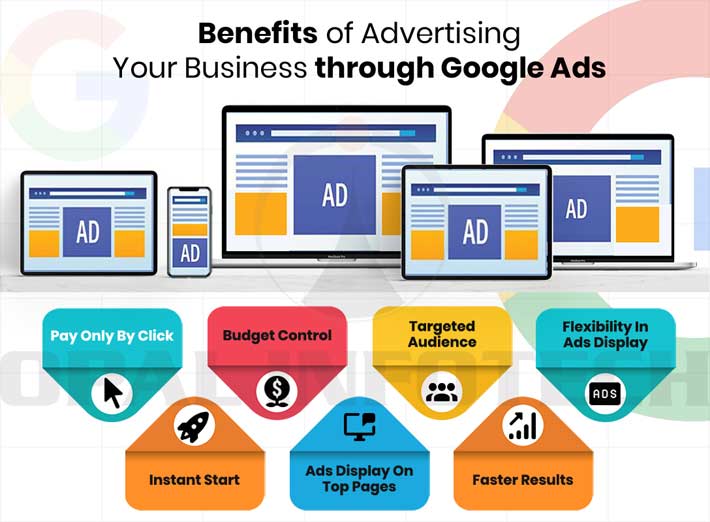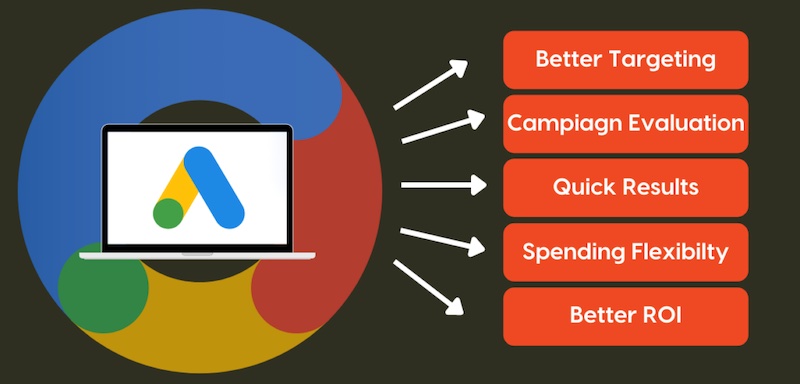Wondering what is the benefit of advertising online with Google ads? From precision targeting to measurable results, explore the power of online advertising. Boost visibility, optimize budgets, and elevate your business in the digital landscape.
What is the benefit of advertising online with Google ads? In the dynamic landscape of digital marketing, advertising online with Google Ads emerges as a pivotal strategy for businesses seeking unparalleled visibility, precision targeting, and measurable results. Being the foremost search engine globally, Google functions as a portal to a vast audience actively seeking products and services. The advantages of utilizing Google Ads go beyond just visibility, providing advertisers with a flexible platform featuring targeted advertising, adaptable budgeting, and real-time adjustability. This introduction explores the manifold advantages of advertising online with Google Ads, highlighting its capacity to enhance brand exposure, optimize marketing budgets, and deliver tangible, data-driven insights for informed decision-making.
What is Google Ads? How does it work?
Google Ads, formerly known as Google AdWords, is an online advertising platform developed by Google. It allows advertisers to display brief advertisements, service offerings, product listings, or videos to web users within the Google advertising network. Ads may be displayed on Google’s search engine results pages (SERPs), on websites within the Google Display Network, in YouTube videos, and in various other online destinations.
What is the benefit of advertising online with Google ads? Here’s a basic overview of how Google Ads works:
- Keyword targeting: Advertisers choose keywords or phrases related to their products or services. When users search for these keywords on Google, the ads may be displayed.
- Ad creation: Advertisers create text-based ads, image ads, video ads, or responsive ads, depending on their goals and the format they prefer. The advertisement content usually consists of a captivating headline, a visible URL, and a descriptive text.
- Bidding: Advertisers establish a maximum bid indicating the highest amount they are willing to pay for each click on their ad (Cost Per Click or CPC) or for every 1,000 displays of their ad (Cost Per Mille or CPM). This bidding mechanism determines the frequency with which the ad will appear.
- Ad rank: Google employs an algorithm known as Ad Rank to ascertain the placement of ads on the search results page. Ad Rank is computed based on the bid value, the ad and landing page quality (Quality Score), and other contributing factors.
- Targeting options: Advertisers can direct their ads based on a range of criteria, comprising geographic location, demographics, device types, and user preferences. This helps them reach specific audiences.
- Ad auction: When a user performs a search, Google runs an ad auction to determine which ads to display. The auction takes into account bid amounts, Ad Rank, and relevance to the user’s query.
- Payment model: Advertisers are charged based on user interaction with their ads, through either clicking on them (CPC) or, for display campaigns, when the ad is shown a set number of times (CPM).
- Ad performance monitoring: Advertisers can utilize performance metrics such as clicks, impressions, click-through rate (CTR), conversion tracking, and more. This data empowers them to evaluate the impact of their campaigns and make necessary modifications.
Google Ads offers a robust platform for businesses to market their products or services to a specific audience and monitor the effectiveness of their advertising endeavors. The platform’s adaptability permits advertisers to manage their budgets, target particular demographics, and gauge campaign performance in real-time.
What’s online marketing?
Online marketing, also referred to as internet marketing or digital marketing, involves utilizing the internet and digital channels to promote and advertise products, services, or brands. It encompasses a diverse array of strategies and tactics to reach and engage a target audience online. Online marketing utilizes a variety of online platforms, technologies, and tools to establish connections with potential customers, enhance website traffic, and accomplish specific marketing objectives.
What is the benefit of advertising online with Google ads? Key components of online marketing include:
- Search Engine Optimization (SEO): The practice of enhancing a website’s visibility in search engine results by optimizing content, meta tags, and other elements to achieve higher rankings for relevant search queries.
- Search Engine Marketing (SEM): Paid advertising on search engines. Pay-per-click (PPC) campaigns are one example of this. In these campaigns, advertisers bid on keywords, and their ads are shown when people search for those phrases.
- Information marketing: Producing and disseminating worthwhile, pertinent information to draw in and involve a certain audience. Posts on blogs, articles, movies, infographics, and more can all be considered content.
- Social Media Marketing (SMM): Advertising goods and services on social media sites such as LinkedIn, Facebook, Instagram, and Twitter. Targeted advertising, community building, and content creation are all part of social media marketing.
- Email marketing: Using email to communicate with potential and existing customers. Email marketing can include newsletters, promotional campaigns, and personalized communication to nurture leads and build customer loyalty.
- Affiliate marketing: Partnering with affiliates or third-party individuals/organizations to promote products or services. Affiliates earn a commission for each sale or lead generated through their marketing efforts.
- Influencer marketing: Collaborating with influencers or individuals with a significant online following to promote products or services. Influencers can help reach a larger and more targeted audience.
- Online advertising: Putting advertisements on different websites, social media pages, and other online channels. These may consist of native ads, video commercials, banner ads, and more.
- Analytics and data analysis: Tracking and evaluating data to gauge how well internet marketing initiatives are working. This entails monitoring user activity, conversion rates, website traffic, and other important information.
- Mobile marketing: Developing methods specifically for users to interact with on mobile devices. This covers mobile advertising, mobile apps, and websites that are optimized for mobile devices.
For companies looking to have a solid online presence, engage with their audience, and produce quantifiable outcomes, internet marketing is essential. In the digital age, it provides a dynamic and adaptable method of contacting customers.
Google Ads for B2B Marketing
Wondering what is the benefit of advertising online with Google ads? Google Ads can be a powerful tool for B2B (business-to-business) marketing when used strategically. B2B marketing on Google Ads involves reaching and engaging other businesses that may be interested in your products or services. Here are some key considerations and strategies for using Google Ads in B2B marketing:
- Keyword strategy:
- Identify relevant keywords: Choose keywords that are specific to your B2B offerings and industry. Consider using a mix of broad, phrase, and exact-match keywords.
- Negative keywords: Use negative keywords to filter out irrelevant traffic and ensure your ads are shown to the most qualified audience.
- Ad copy:
- Craft compelling ad copy: Write clear and persuasive ad copy that highlights the value proposition of your B2B products or services.
- Include keywords: Integrate your target keywords into your ad copy to improve relevance and visibility.
- Targeting options:
- Geographic targeting: Specify the locations where you want your ads to appear to reach businesses in your target regions.
- Demographic targeting: Refine your audience based on business-related demographics, such as industry, company size, or job titles.
- Ad extensions:
- Use ad extensions: Take advantage of ad extensions like site link extensions, callout extensions, and structured snippet extensions to provide additional information and encourage clicks.
- Landing pages:
- Create dedicated landing pages: Design landing pages that are tailored to the needs and interests of B2B customers. Ensure they provide detailed information about your offerings and include clear calls to action.
- Conversion tracking:
- Set up conversion tracking: Define and track meaningful conversion actions, such as form submissions, phone calls, or downloads. This helps measure the effectiveness of your B2B campaigns.
- Remarketing:
- Implement remarketing: Target businesses that have previously visited your website but did not convert. Create tailored ads to re-engage them and encourage them to take the next step.
- Ad schedule and bid adjustments:
- Optimize ad schedule: Analyze the times and days when your B2B audience is most active and adjust your ad schedule accordingly.
- Bid adjustments: Use bid adjustments based on device, location, or time to maximize the visibility of your ads during peak periods or in specific locations.
- Utilize different ad formats:
- Experiment with various ad formats: Test different ad formats, including text ads, display ads, and responsive search ads, to determine which resonates best with your B2B audience.
- Monitor and optimize:
- Regularly review performance: Analyze key metrics like click-through rate (CTR), conversion rate, and cost per conversion. Make data-driven optimizations to improve campaign performance over time.
These methods can be combined to create powerful B2B marketing campaigns on Google Ads. You can then continuously improve your approach based on performance statistics. Remember that knowing your target demographic and modifying your tactics appropriately will determine the success of your marketing.
What is the benefit of advertising online with Google ads?
Certainly! Below is a table outlining some key benefits of advertising online with Google Ads:
| Benefit | Description |
| Global reach | Google Ads allows you to reach a vast global audience, expanding your brand’s visibility internationally. |
| Targeted advertising | Precision targeting options enable you to reach specific demographics, interests, and geographic areas. |
| Cost control | Set daily or campaign budgets to control spending and allocate resources based on your advertising goals. |
| Measurable results | Detailed analytics provide insights into campaign performance, allowing for data-driven decision-making. |
| Pay-per-click (PPC) | You only pay when someone clicks on your ad, ensuring that your budget is spent on actual engagement. |
| Adaptability | Easily modify ad campaigns in real-time, adjusting keywords, budgets, and targeting based on performance. |
| Ad extensions | Enhance ads with additional information, such as links, phone numbers, or location details, for more visibility. |
| Keyword relevance | Connect with users actively searching for products or services related to your business through targeted keywords. |
| Ad placement control | Choose specific websites, apps, or placements within the Google Network to tailor your ad’s visibility. |
| Mobile optimization | Reach users on various devices, particularly mobile users, with ads optimized for different screen sizes. |
| Remarketing opportunities | Re-engage with users who have previously visited your website, reinforcing your brand and encouraging conversions. |
| Quick results | Start seeing results quickly, as Google Ads can drive traffic and leads faster than many traditional advertising methods. |
What is the benefit of advertising online with Google ads? It’s important to note that the effectiveness of Google Ads depends on various factors, including campaign strategy, industry, competition, and the quality of your ad creatives. Regular monitoring and optimization are crucial for maximizing the benefits of online advertising with Google Ads.
Is advertising on Google worth it?
The value of Google advertising varies depending on several variables, such as your target market, budget, business objectives, and the efficacy of your advertising plan. What is the benefit of advertising online with Google ads? For many firms, Google AdWords can be quite advantageous. Here are some reasons why it’s frequently seen to be worthwhile:
- Reach and visibility:
Google is the most widely used search engine globally, and advertising on Google allows you to reach a vast audience. Your ads can appear on Google Search, Display Network, YouTube, and other partner sites.
- Targeted advertising:
Google Ads provides robust targeting options. You can target specific keywords, demographics, locations, devices, and more. This precision helps you reach a highly relevant audience interested in your products or services.
- Cost control:
Google Ads offers flexibility in budgeting. A daily budget that you specify and can modify at any time. Furthermore, you have control over your expenses because you only pay (Pay-Per-Click, or PPC) when someone clicks on your advertisement.
- Measurable results:
Google Ads provides detailed analytics and reporting tools. Important performance indicators are available for monitoring, including return on investment (ROI), conversion rate, and click-through rate (CTR). With the use of this data, you may assess how successful your campaigns are.
- Quick results:
Unlike some traditional forms of advertising, Google Ads can deliver quick results. Once your campaign is set up, your ads can start appearing to users actively searching for relevant products or services.
- Adaptability:
Google Ads allows you to make real-time adjustments to your campaigns. You can test different ad copies, keywords, and targeting settings to optimize performance based on data and insights.
- Remarketing opportunities:
Google Ads enables remarketing, allowing you to target users who have previously visited your website but didn’t convert. This can be an effective strategy for re-engaging potential customers.
- Local advertising:
What is the benefit of advertising online with Google ads? For businesses with a local focus, Google Ads allows you to target specific geographic locations. This is beneficial for reaching potential customers in your immediate vicinity.
But it’s imperative to approach Google AdWords with a carefully considered plan. If you just throw money at advertisements without knowing who your target audience is, establishing specific goals, and continuously refining your campaigns, you might not get the desired outcome.
Before deciding if Google Ads is worth it for your business, consider factors such as your industry, competition, and the lifetime value of a customer. It may also be beneficial to test the platform with a smaller budget initially to assess its effectiveness for your specific needs. Regular monitoring, analysis, and optimization are key to maximizing the return on investment from your Google Ads campaigns.
Why should you advertise on Google?

Wondering what is the benefit of advertising online with Google ads? Businesses trying to reach their target audience, boost online exposure, and accomplish particular marketing goals can benefit greatly from Google advertising. The following are strong arguments in favor of considering Google advertising:
- Vast audience reach:
With billions of searches made daily, Google is the most popular search engine in the world. By running ads on Google, you can reach prospective clients who are actively looking for goods or services associated with your company and take advantage of this enormous user base.
- Targeted advertising:
Google Ads provides sophisticated targeting options, allowing you to tailor your ads to specific demographics, locations, devices, and user behaviors. This precision helps you connect with a highly relevant audience interested in what your business offers.
- Keyword relevance:
You can place bids on business-related keywords with Google AdWords. Your advertising may show up when consumers search for such terms, making sure that people with certain needs or interests see your message.
- Pay-Per-Click (PPC) model:
Pay-per-click advertising is used by Google AdWords, so you only have to pay when someone clicks on your advertisement. This guarantees that you only pay for real interaction with your content and permits cost control.
- Flexible budgeting:
Google Ads accommodates businesses of all sizes with flexible budgeting options. You can set a daily budget, and you can adjust it at any time based on your advertising goals and financial considerations.
- Measurable results:
Google Ads provides robust analytics and reporting tools. Important performance indicators are available for monitoring, including return on investment (ROI), conversion rate, and click-through rate (CTR). You can use this data to evaluate the success of your efforts and make informed decisions.
- Quick results:
Unlike some traditional advertising methods, Google Ads can deliver quick results. Once your campaigns are set up, your ads can start appearing to users immediately, allowing you to capture the attention of potential customers actively seeking your products or services.
- Adaptability and optimization:
Google Ads allows for real-time adjustments to your campaigns. You can test different ad copies, keywords, and targeting settings to optimize performance based on insights and data.
- Local advertising:
For businesses with a local focus, Google Ads allows you to target specific geographic locations. This is particularly beneficial for attracting customers in your immediate vicinity.
- Remarketing opportunities:
Google Ads supports remarketing, enabling you to re-engage users who have previously visited your website. This can be a powerful strategy for reinforcing your brand and encouraging conversions.
As a result, Google advertising offers a scalable and efficient means of connecting with new clients, promoting your company online, and producing quantifiable outcomes. The platform is a useful tool for companies of all sizes and sectors due to its adaptability, targeting possibilities, and analytics capabilities.
How does Google Ads help advertisers?
Google Ads provides advertisers with a powerful platform to reach their target audience, increase brand visibility, and achieve specific marketing goals.
So, what is the benefit of advertising online with Google ads? Google Ads provides advertisers with a comprehensive and versatile advertising platform that combines reach, precision targeting, flexibility, and measurement capabilities. As a result, it may be used to effectively accomplish a range of marketing goals and establish connections with prospective clients at different points in the purchasing process.
Conclusion
In this article, we have addressed the question of what is the benefit of advertising online with Google ads. In conclusion, Google Ads for online advertising has a multitude of advantageous effects that are wide-ranging, making it an effective tool for companies looking to build a solid online presence and achieve measurable outcomes. Google Ads provides a complete solution for companies of all sizes, from its worldwide reach and customized advertising capabilities to the flexibility of cost control and the capacity to measure outcomes precisely. While the pay-per-click model guarantees cost-effectiveness, other aspects that improve the total impact of ads include mobile optimization, keyword relevance, and ad extensions. Because of its flexibility and speedy outcomes, Google Ads is a dynamic platform that can be adjusted to meet changing marketing goals. Businesses that fully utilize Google Ads may efficiently reach their target audience and maintain their competitiveness in the constantly changing online advertising market. Businesses hoping to succeed in the digital age must continue to strategically leverage the advantages of Google Ads as customer behavior and technology continue to change.




